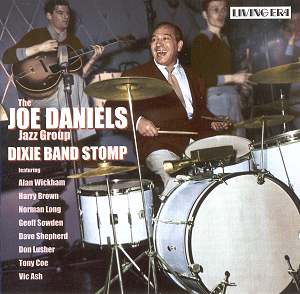As
a young drummer, I was a keen fan of some
records I inherited that Joe Daniels made
in the series he called "Drumnasticks" (although,
not realising it was a pun on gymnastics.
I erroneosuly pronounced it "drum-nerr-sticks"
instead of "drum-nass-ticks"!).
I liked these records because they put the
drummer centre-stage. Unfortunately, this
collection consists of recordings made between
1951 and 1955 - after the era of "Drumnasticks",
when Joe had moved on from his band the Hot
Shots and now led the Joe Daniels Jazz Group.
So Joe doesn't play many drum solos on this
album.
Nevertheless,
at various times his new band included several
musicians well-known today, such as Tony Coe,
Vic Ash, Dave Shepherd and the late Don Lusher.
Thus the standard of the music is reasonably
high, even though the repertoire comprises
such hackneyed Dixieland numbers as Doctor
Jazz, Jazz Me Blues
and Bugle
Call Rag.
Wolverine
Blues,
recorded at a Festival Hall concert in 1951,
shows how Joe could please an audience with
lively, well-arranged versions of old tunes.
After all, Joe was a great showman who had
paid his dues by playing on many transatlantic
cruises and with various bands (including
Harry Roy for six years).
His
star seemed to wane as the Trad Boom arrived
and the spotlight was taken by Barber, Ball
and Bilk, although he continued leading bands
into the 1970s. This album is a fine reminder
of a band that is in danger of being forgotten.
The music is not particularly subtle nor profound
but the ensembles are well drilled and many
of the solos worth hearing. Now, please can
Living Era assemble a compilation of earlier
recordings by Joe Daniels' Hot Shots?
Tony Augarde
Not many pre-War bandleaders
revived their careers after hostilities ended
but Joe Daniels was one. His Hot Shots had
been a popular working outfit but his canny
awareness of musical trends and his characterful
drumming ensured that his later outfit was
to prove equally successful. They played Dixieland
- and so largely stood apart from the major
schisms between Bop and Revivalist purists
in Britain, though clearly the modified Chicago
influence was there, not least in the trumpet
playing of stalwart Alan Wickham, an underrated
player on the local scene.
Trombonists included Harry Brown, much improved
since his earlier days with Humph, and Geoff
Sowden. Paul Simpson was an effective clarinet
player but Dave Shepherd was a real advance
for the band. Later on the young Tony Coe
joined alongside Don Lusher and the band took
on another face. By November 1953 Vic Ash
was recording with the band. These last names
attest to the technically high standards evinced
- Coe, Lusher and Ash would be in anyone's
book as eloquent technicians and soloists.
Some of the earlier tracks are slightly corny.
The O.D.J.B. tribute - Livery Stable Blues,
or Barnyard Blues to give its original O.D.J.B.
title - comes from a Royal Festival Hall concert
and shows Daniels's drumming, exuberant though
it may have been, as rather thick and too
heavily textured for comfort. Later on though
things improve. Sowden shows his Jack Teagarden
allegiances with a lusty solo in Five Point
Blues. Meanwhile his replacement Don Lusher
extols the buzzy tone of Scotsman George Chisholm
on Morton's Honey Babe and does so charismatically.
Stylistically the group embraced jump band
riffs - The Dixie Band Stomp - and they strove
to create intros that were piquant and entertaining,
a feature of the band from 1953 onwards.
By the end of that year Vic Ash was showing
awareness of modern developments - Buddy de
Franco principally - though he was not to
lose his love of Goodman's playing. By the
final incarnation here in January 1955 with
a new outfit (bar Wickham) the band was playing
straight-ahead Chicago style and very adeptly.
Enjoyable stuff then and some intriguing glimpses
of the young Ash, Lusher, Coe and co. Daniels
is the marshalling supremo, Krupa-inspired
and sometimes too heavy (but not too often).
Good transfers and fine notes from Digby Fairweather,
a classy man to be writing for you.
Jonathan Woolf
1.
At a Georgia Camp Meeting
2. Washington and Lee Swing
3. Barnyard Blues
4. Wolverine Blues
5. Corrine, Corrina
6. Wang Wang Blues
7. Doctor Jazz
8. Five Point Blues
9. The Dixie Band Stomp
10. Weary Blues
11. That Da Da Strain
12. Runnin' Wild
13. Riverboat Shuffle
14. I Got Rhythm
15. Sobbin' Blues
16. Honey Babe
17. Black and Blue
18. Royal Garden Blues
19. I Wish I Could Shimmy Like My Sister Kate
20. Nobody Knows You When You're Down And
Out
21. Jazz Me Blues
22. Susie
23. Spain
24. Bugle Call Rag
25. I Ain't Gonna Give Nobody None o' this
Jelly Roll
26. Crazy Rhythm
27. Marie
28. Rosetta
Joe
Daniels – Drums
Alan Wickham - Trumpet (tracks 1-25, 27, 28)
Harry Brown - Trombone (tracks 1, 2, 17, 18)
Geoff Sowden - Trombone (tracks 3-12)
Paul Simpson - Clarinet (tracks 1-4)
Norman Long - Piano (tracks 1-8, 17, 18)
Nevil Skrimshire - Guitar (tracks 1-16, 19-22)
George Peacey - Bass (tracks 1-4)
Dave Shepherd - Clarinet (tracks 5-12, 19-22)
George Davis - Bass (tracks 5-16, 23-25)
Don Lusher - Trombone (tracks 13-16, 19-25)
Tony Coe - Clarinet (tracks 13-16)
Stan Foster - Piano (tracks 13-16)
Bernie Stanton - Clarinet (tracks 17, 18)
Johnny Oxley - Bass (tracks 17-22)
Vic Ash - Clarinet, alto sax (tracks 23-26)
Stan Butcher - Piano (tracks 23-26)
Laddy Busby - Trombone (track 26)
Tony Barr - Bass (track 26)
Orm Stewart - Trombone (tracks 27, 28)
Don Francis - Clarinet (tracks 27, 28)
Ray Webb - Tenor sax (tracks 27, 28)
